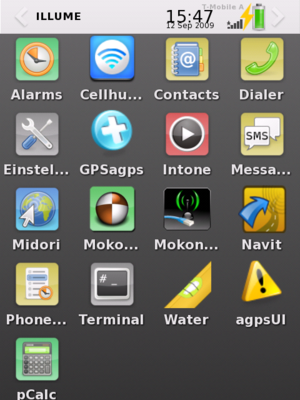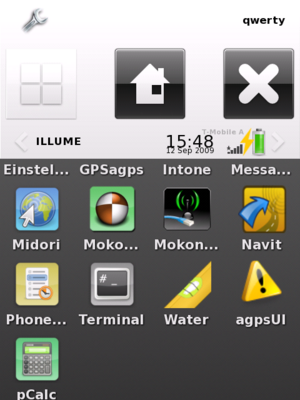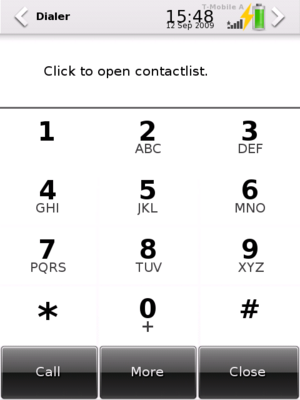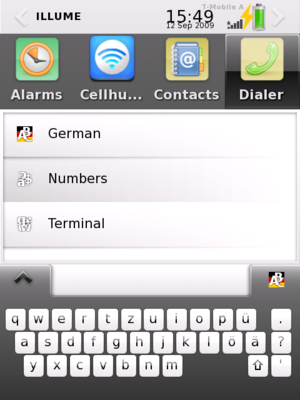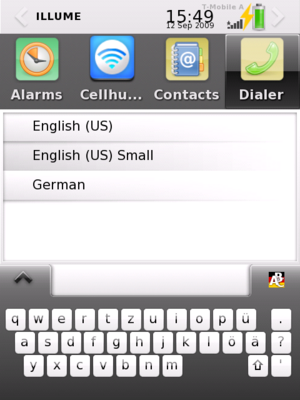Configure SHR for German-speaking use
From Openmoko
(→Localize for AT) |
(→Installed Programs) |
||
| Line 219: | Line 219: | ||
* Midori | * Midori | ||
small webbrowser, usable but not really the best | small webbrowser, usable but not really the best | ||
| − | * Moko... | + | * <del>Moko...</del> |
| − | mokomaze, you might know it from some mobile phones | + | <del>mokomaze, you might know it from some mobile phones</del> |
* Mokon... | * Mokon... | ||
Mokonnect, scans for WLAN networks, and does some other stuff (i have NOT yet successfully connected to any WLAN networks) | Mokonnect, scans for WLAN networks, and does some other stuff (i have NOT yet successfully connected to any WLAN networks) | ||
Revision as of 13:34, 3 October 2009
Contents |
News
| 2009-09-01 | first version with austrian stuff, and focus on everyday usability |
| 2009-09-12 | based on SHR unstable, and with opkg upgrade support |
| 2009-10-03 | Cannot satisfy the following dependencies ... libfso-glib0, that is an SHR issue, i hope it will be fixed soon |
| 2009-10-03 | moved name of page to "German" |
Overview, what the hell is this page???
This article focuses on configuring SHR(-unstable) image for a daily use in a german speaking area. the author is Austrian so the main focus is on Austrian use. with help of other users it is also useable for germany, switzerland.
focus points (which out-of-the-box SHR does not provide)
- stable use as daily phone (calls, sms)
- keep reboot and crash frequency at 1/per day maximum (meaning only have to reboot once a day at most!)
- stable use as navigation device in german-speaking area, with understandable german speech
- only need to recharge once a day (meaning battery should hold 1 day in normal use)
- prevent neo usage from driving you crazy, because some litte things just don't work
Installing
- have at least 1,5 hours of time ready, for the whole procedure
- have fast internet, you need to download lots of stuff
Downloading Bootloader, Kernel, Root Image
- download exactly these versions of SHR from z0ph
1. [1] qi boot loader
2. [2] kernel (kernöl)
3. [3] root image
These are the original names of the files:
qi-s3c2442-1.0.2+gitr3b8513d8b3d9615ebda605de4bda18371aa3f359.udfu
shr-lite-glibc-ipk--20090808-om-gta02.rootfs.jffs2
uImage-2.6.29-oe11+gitr119838+2d158aae9d8d36f575504f59884ed8e80802efe2-r3.5-om-gta02
Flashing Neo
- flash qi, kernel and root image to your neo (i tested this on GTA02v6). Detailed instructions for Freerunner
The installation should be flashing like (do it in DFU mode of NOR u-boot):
dfu-util -a u-boot -R -D qi.udfu dfu-util -a kernel -R -D uImage.bin dfu-util -a rootfs -R -D rootfs.jffs2
Customization Package
Preparing your SD card
Maybe you installed other Distributions on your OpenMoko before and you have EXT2 or EXT3 partition on you SD card and want FAT partition, then install dosfstools on your Neo to have mkfs.vfat available.
opkg install dosfstools
Format SD card (resp. partition) if and only if the format is not FAT and you want a FAT partition on your SD card.
mkfs.vfat -v -n maps-data /dev/mmcblk0p1
Make the base dir
cd /media/card mkdir "____shr_testing"
Download customize pack and transfer file to Freerunner via sftp.
Option 1: customize pack with maps (48 MBytes)
Or you can use wget from your neo if you have internet connection (e.g. via USB established)
cd /media/card/____shr_testing wget http://work.zoff.cc/openmoko/shr/de_at/customize_pack_shr.tar.gz
you can instead download customize pack without navit maps, its a bit smaller and transfer this alternative file to your Freerunner via sftp.
Option 2: customize pack without maps (20 MBytes)
Or use wget from your neo if you have internet connection (e.g. via USB established)
cd /media/card/____shr_testing wget http://work.zoff.cc/openmoko/shr/de_at/customize_pack_shr_no_maps.tar.gz
Unpack Customization Pack
Unpack the customize pack and transfer to your SD-Card (to /media/card/____shr_testing/) or transfer tar.gz-file to /media/card/____shr_testing/ and unpack on that partition
cd /media/card/____shr_testing/ gzip -d customize_pack_shr.tar.gz tar -xf customize_pack_shr.tar
To download (or update!!) the austrian map file later do (you need fast internet on your neo):
cd /media/card/____shr_testing/navit/ ./get_austria.map.sh # this will download about 350 MBytes!!
The script "get_austria.map.sh" is just a wget call:
#! /bin/sh cd /media/card/____shr_testing/navit/maps/ wget -O aut_hu_cz.bin http://maps.navit-project.org/api/map/?bbox=3.9111328125,42.8466796875,23.2470703125,51.1083984375
If you want the map of Germany map be downloaded add the script "get_germany.map.sh" to the folder /media/card/____shr_testing/navit/:
#! /bin/sh cd /media/card/____shr_testing/navit/maps/ wget -O germany.bin http://maps.navit-project.org/api/map/?bbox=5.185546875,46.845703125,15.46875,55.634765625
Or select your map manually on http://maps.navit-project.org/download/ .
Startup
- boot up your neo, and let it run until you are logged in to your GSM net
- then shutdown the neo (press and hold power button for a few seconds)
- boot up your neo again, and let the neo log in to your GSM network again.
Localize for AT
- for GOD's sake try NOT to get any phonecalls while you do this part
- now connect your neo with usb and login via ssh
- you NEED internet on your neo for this, otherwise dependent packages can't be downloaded
- start (as root on your neo):
cd /media/card/____shr_testing/ ./init_shr_testing.sh
- this will take some time !! have coffee ready :-)
- wait for the customize script to finish
- now at least reboot 1 time (better 2 times)
- [UG1] now start (also as root on your neo):
opkg update opkg upgrade -force-defaults
- dependency issue
(Sep. 28th 2009) upgrade stop with the following collected errors:
ERROR: Cannot satisfy the following dependencies for fsousaged: libfso-glib0 (>= 0.2.1+gitr47+7608c8d98bb65bb5beca6621eb86920b71df1bc9) *
to fix this try:
opkg install libfso-glib0
or:
opkg install http://build.shr-project.org/shr-unstable/ipk/armv4t/libfso-glib0_0.2.1+gitr47+7608c8d98bb65bb5beca6621eb86920b71df1bc9-r0_armv4t.ipk
- [UG2] when finished start as root:
cd /media/card/____shr_testing/ ./do_upgrade_shr.sh
- hopefully no errors have occured
- [UG1] [UG2] repeat those 2 steps every few days, if you want (dare) to receive all the bleeding edge updates
Test it
- reboot your neo, and let the neo login to your GSM network
- now navit should have austrian maps, and speak in german to you :-)
- you can suspend/resume anytime! even when navit is speaking! yeah really, it works
- date and time should also be correct
- press AUX button quick and zedlock should come up, draw a big "Z" to unlock again
- hold POWER button for 2 seconds, and neo will shutdown
- if shutdown with POWER button fails, go to illume home screen, pull down the menu and press the big red "X", a menu should appear
Test it (german)
- Navit sollte alles in deutsch anzeigen, österreichkarten laden und vor allem der Neo sollte beim Laufen von Navit nicht blanken oder suspenden.
Startup Times
| 0:00 | press button to boot neo |
| 0:17 | splash logo visible |
| 1:29 | enlightenment splash screen visible |
| 2:02 | illume topshelf visible |
| 2:28 | illume desktop icons visible |
| 3:34 | GSM logged in |
those times seem pretty catastophic in comparison to a normal mobile phone
yet for the neo they are really not so bad :-)
Screenshots
Feedback
- please give some feedback
Features
Installed Programs
- German keyboard, with German dictionary (word list)
- Gridpad keyboard (if you want this you can set it in the enlightenment config "wrench" under Keyboard section)
- Cellhunter
on first start choose language (german i guess), then enter name and password. can be anything, and you really don't need to remember it later. if you can't get AGPS working where you are, just wait for a GPS fix and upload that data to cellhunter. now you can instantly use it for AGPS, isn't that nice ...
- GPSagps
refresh agps data from u-blox.com (and cellhunter), you need an account there (its free)
you can configure it in /etc/agps-online.conf
sample /etc/agps-online.conf:
[config] user=XX@YY.com password=mypassword
- Midori
small webbrowser, usable but not really the best
-
Moko...
mokomaze, you might know it from some mobile phones
- Mokon...
Mokonnect, scans for WLAN networks, and does some other stuff (i have NOT yet successfully connected to any WLAN networks)
Navit version from SVN. it shows full austria,german und switzerland map. speaks to you in german. it takes almost all CPU you have, so don't push it too far. otherwise it works very well.
- Settings
shr-settings from SHR. runs really fine. I just made some small changes
- Terminal
valaterm
- Water
Water level
- agpsUI
use this great program ONLY as a last resort. it does NOT play well together with FSO and frameworkd
- Intone...
Intone music player. put your music files in /media/card/music/ directory
- zedlock (no icon, use AUX button)
great screen locker. draw a big "Z" on the screen in 1 second to unlock screen
- gpe-scap (no icons, only command line)
login via ssh to your neo. start
export DISPLAY=:0 ; gpe-scap
on commandline to make a screenshot.
- sms-sentry (no icon, send sms)
Send sms with text "sentry<passwd>:location" to your neo, and get an sms with current position back. default passwd is '12345'. you can confiure it in /etc/sms-sentry
sample /etc/sms-sentry:
[config] password=54321

